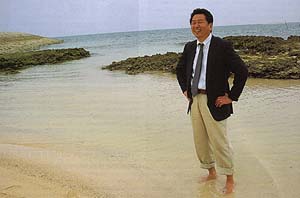Call of the Wind
Back to Contents of Issue: May 2002
|
|
|
|
|
|
 CSK COMMUNICATIONS, A CSK group company that provides technical and other support services via call centers, set up shop in Okinawa in April 1998 even before the government's current favorable economic treatment for the southern islands began. The company was listed on Nasdaq Japan last September, mainly because the incentives offered by Tokyo and Okinawa helped enable it to IPO two years earlier than initially planned. CSK COMMUNICATIONS, A CSK group company that provides technical and other support services via call centers, set up shop in Okinawa in April 1998 even before the government's current favorable economic treatment for the southern islands began. The company was listed on Nasdaq Japan last September, mainly because the incentives offered by Tokyo and Okinawa helped enable it to IPO two years earlier than initially planned.CSK's headcount has soared from 40 two years ago to 260 now: What's more, all of the staff -- with the exception of the president, Hisatoshi Kawamoto -- are native Okinawans. Kawamoto has found his employees' affability to work in both positive and negative ways. When it comes to customer service they are second to none, but at the same time, they make productivity lower as they spend more time per person talking to customers. Kawamoto believes they have gradually overcome the issue of 'excessive friendliness.' Takehiko Kambayashi spoke to Kawamoto in his Naha headquarters. Didn't people laugh at you when you said you were going to start a company in Okinawa? Yes, yes, I was being laughed at -- some of them were saying, "Oh, poor guy, he's been transferred to a southern island!" Many also doubted if the business could be successful in Okinawa. Why did you want a call center here to begin with? First of all, I wanted to work on the integration of call centers. It was at the beginning of the recession that we launched our business, and we came to realize the importance of one-to-one marketing. When we considered good ways of contacting customers, what came to mind was a call center and the Internet. Then, we thought Okinawa would be an appropriate location because a call center like ours needs young employees. When you look at Okinawa, its youth unemployment rate is very high and, although there are few jobs, many Okinawans want to stay here, so there hasn't been a brain drain. We thought we could find some excellent people among them. You said people doubted at first if you could succeed here. What was their biggest concern? The difficulty finding skilled employees. Luckily, we can make a long-term investment in employees, since young Okinawans don't want to go elsewhere and there are few IT jobs available here. We educate them and let them acquire qualifications but, unlike Tokyo, there is no headhunting. In Tokyo you can find skilled employees with potential if you offer them good money, but you're lucky if they stay for two or three years. They would probably go somewhere else after one year, so you cannot invest in them. In Okinawa, we can do that: It probably costs us more for the first year, but after that, it costs less, as employees become educated and skilled. What have you learned? There are so many call centers in Okinawa now, but some companies have not been successful because they have brought managers from the mainland to control the locals. However, only four of us came here at first from the parent company and now most of our leaders are Okinawans, who can educate fellow Okinawans. All your employees are locals? Yes. Moreover, 60 percent are college graduates, and 10 percent of the graduates have studied abroad. Do you think Okinawans have a more international outlook? Certainly, but there is a huge gap between those who are progressive and those who are not. I can see a change in young Okinawans. What is the most unexpected reward here? This is a healing island. When you step out of the office time slows down, you feel like, "Okay, we don't have to work any more today." When I wear a suit I'm in Tokyo mode, but coming here I feel very relaxed, shunning a suit and going casual. A call center job can be stressful, so we try to think about our employees' welfare as much as possible. From April, it's still bright outside even at 6 p.m., so, you can go to the beach even after work if you want to. This May marks the 30th anniversary of Okinawa's reversion from US control. Where do you think CSK Communications will be 30 years from now? I've never thought about that. But when you look at the markets in Southeast Asia, Okinawa is in a good location as there are so many languages spoken in the region. So just like call centers in Dublin, Ireland, which have employees who are able to respond to customers in 12 languages, the idea that Okinawa has a call center that can cover Southeast Asian countries, handling customers in many languages, may evolve. You said you now have so many visitors from the mainland. Is your success making them jealous? Oh, yes. Many people are saying, "We also want to establish a call center in Okinawa, we also want to have an office here, and Tokyo no longer has to be our base." I think Okinawa should have more and more people come to work in this wonderful environment. Apart from the business benefits, I believe it offers a far better quality of life. @ |
|
Note: The function "email this page" is currently not supported for this page.






